- Home
- Lorenzo Carcaterra
The Vulture's Game (Short Story) Page 3
The Vulture's Game (Short Story) Read online
Page 3
“He doesn’t seem to mind,” Al said. “All he seems to care about is the work. That’s where he gets whatever pleasure he needs.”
“Maybe,” Scanlon said. “But that won’t work for me. By the time I’m done, everybody’s going to know my name. The same holds for you as well if you stick along for the ride.”
That end of it was most certainly true. Frank took what his father left him—a string of middle-income buildings in lower Manhattan and a handful of three-star restaurants and two all-night diners—and over three decades he built an empire. He was carefree about regulations, never bothered reading the fine print on any contract, took on high-risk mortgages and tossed the extra interest on to those who clamored to live in one of his buildings.
He also held true to having his name known. He dated supermodels and movie stars, partied till all hours at any club guaranteed to publicize the fact that he had been there, was a regular in the gossip pages and on panel shows. He drank, drugged, ran afoul of the law, and was sued by so many people he had to hire someone to keep track. And always, always, Al Collins was there to pick up the pieces he’d dropped.
As hectic a roller-coaster ride as the first two decades had been, Scanlon had ratcheted up the stakes during the last ten years. He moved into casinos, ventured into a millionaires’ club–call-girl operation, talked with drug dealers about investing in their product. A cautious man like Al Collins figured all this activity could lead to nowhere but trouble.
Now, Collins would do his all to protect his boss and friend. His years with Scanlon had made him wealthy beyond imagination. He owed Scanlon loyalty in return for the seven-figure bank account. But Collins’s strength lay in sorting out contracts, working out troubled mortgages, and managing buildings that were falling behind on their payments. Any muscle that was used came from Scanlon and the associates that he made sure steered clear of Al. But now, even with all that hidden muscle at his beck and call, Scanlon had walked into the crosshairs of Carlo Marelli, and that was a dangerous place. Frank could brush off Carlo as an out-of-touch old mobster, and even treat his nephew as if he were pledging for a fraternity, but Collins knew better.
“You want me to meet with him and see what it is he wants?” Collins asked.
“Meet with who?” Scanlon said.
“The kid,” Collins said.
“The kid? Why the hell would you want to meet with him?” Scanlon asked. “He’s a nobody.”
“That’s not what I hear, Frank,” Collins said.
“Oh yeah?” Scanlon said. “Humor me, then. Let me hear what it is you hear.”
“He’s got his uncle’s trust,” Collins said. “Marelli wouldn’t have laid this on him if that weren’t the case. And …”
“And what?”
“If the rumors are true—and that’s all they are at this point,” Collins said, “then that kid who sat across from you in this office will be the one calling the shots after the old man dies. If not before.”
“Unless the kid goes down first,” Scanlon said. “That might change the old man’s thinking, no?”
“Take a breath, Frank,” Collins said, “and let’s try and remember who the gangsters in this equation are. Here’s a hint—it’s not us. Our stories end up in the real estate section or the gossip sheets. Their stories end up on the front page, without their names in it. Only the victims get identified.”
“The college kid is not going to go away,” Scanlon said. “So the way I see it, I have only two choices. I make a deal with him and back off on any plans to expand my business. That’s the cleanest solution and the one you probably want me to take. Am I wrong?”
“I haven’t heard the second option,” Collins said, “but yes, that does make sense. We leave their end alone and they’ll leave ours.”
“That would work,” Scanlon said, “but only short-term. This kid, the one you said is going to move up when his uncle goes down? He’s going to make a move against me sooner than later. And later he’ll be stronger. So if I’m going to step on him, the time to do it is now. Make him understand I will not tolerate a move against me. Not now. Not ever.”
“Step on him?” Collins said. He sounded as stunned as he looked. He had been by Scanlon’s side long enough to know that Scanlon was not opposed to bending the law to suit his needs. But this was something else. “How do you propose to do that? Forget that he’s a college kid. Remember who his uncle is. You do damage to that kid, and you think a man like Marelli is going to let it slide? You want to touch his family? Whatever you’re thinking of doing, I suggest you think again.”
“Oh, relax,” Scanlon said. “I didn’t say I was going to have the kid tossed into the Hudson, though the thought is tempting. There are a lot of ways to scare somebody off. This kid’s led a prime beef life up till now, protected and shielded by his uncle. He’s never had to go into the gutter, bump heads with guys like me. I’d like to know what he does if something like that were to happen. We’re just roughhousing here. Nothing more to it than that.”
“How rough?”
“Schoolyard stuff,” Scanlon said. “Just enough to screw with his tough-guy act. Then we’ll know the kind of guy we’re up against.”
EAST HAMPTON, NEW YORK, AUGUST 15, 2002
3:15 P.M.
Uncle Carlo sat across from Jimmy, the two of them alone in the library, a large chessboard between them.
“So what do you think, kiddo?” Uncle Carlo asked. “You figure your cousin is up for this?”
Jimmy shrugged, then shook his head.
“Yeah, me neither,” Uncle Carlo said. “He’s smart, but is he his father’s boy?”
Jimmy wrote a short note and dropped it on top of the board. Carlo picked it up and read it. “Not even as kids,” he said. “My brother and me were as opposite as opposites could be. He always looked for the good in people, even the ones who treated him like shit—and there were plenty of those in our neighborhood. Me? I didn’t see much good in anybody.”
Jimmy pointed to his heart and then at his father.
“I wouldn’t go so far as to say I loved him,” Carlo said. “But I looked out for him—without him knowing about it, mind you. That was a shit storm I didn’t need, you know what I mean?”
Carlo waited as Jimmy scrawled another note. He enjoyed the time spent with his son, helping him fill the void he felt over both the loss of his wife and the often unbearable weight of watching Jimmy deal with his disease and destiny with class and determination.
Carlo reached for the note and read it. He paused before he answered. “I can’t, Jimmy,” he finally said. “I wish I could. Believe me, there is nothing I would have wanted more than to pass what I built on to you. But it can never be, and thinking about it will only add to your pain. If Vincent fails, then I need to look in another direction. Maybe Angela, in Naples? Maybe someone else in the family? I don’t know.”
Uncle Carlo glared at Jimmy when he saw tears sliding down the sides of his face, but then forced himself to look away. He stood, leaned down, kissed Jimmy on the head. “You’re my prince, Jimmy. But you’re not a Don.”
Carlo walked toward the bar and poured himself a glass of Fernet Branca. He took a long sip and then walked toward the floor-to-ceiling windows that looked out on the lush garden and the waves of the ocean below. “I would have given anything to have my own son replace me as Don,” he said, his voice low. “That card just didn’t happen to be in our deck. We can cry over it all we want, but that’s not going to change a damn thing. Vincent will be your Don and you will accept him as such.”
Carlo turned away from the window and walked toward Jimmy. He looked down at his son, drink gripped in his right hand. “You will accept him as such, correct?”
Jimmy stared up at his father and didn’t move.
“I need to know it,” Carlo said. “I need to know you will back my choice.”
Jimmy closed his eyes and nodded.
Carlo nodded. “Now, just because you can’t be Don doesn’
t mean you can’t be of value to this family. If Vincent asks for help, you give it and you give it your best. He loves you and he trusts you. Apart from the resentment you feel over losing out to him, I’m pretty sure you feel the same way about him. I’d like it to stay that way. Now and after I’m gone. You good with that?”
Jimmy nodded again.
“I’m going to let you in on a secret,” Carlo said, starting to make his way out of the room. “A Don, any Don, from me up to Luciano, Costello, even back to Giuliano, we’re each of us only as good as the people we surround ourselves with. That’s the key. Charlie Lucky had Meyer and Bugsy—one the brains, the other the muscle. That’s why he died in Naples and not in some hellhole prison somewhere in the Midwest. Me? I got you and I got Vincent. And I’m good with that. I got strong and smart, both of you watching my back. And all you really need is two. Any more than that and you’re pushing your luck.”
Uncle Carlo walked out of the room, closing the door gently behind him. He stopped when he heard Jimmy toss the chess pieces angrily to the floor. Carlo took a deep breath and closed his eyes, and then walked with head bowed down the long, carpeted corridor.
UPPER WEST SIDE, AUGUST 16, 2002
9:25 P.M.
I had the car drop me off on Riverside Drive, just off the 79th Street exit. Lisa’s apartment was only a few blocks away and I needed the walk. I wasn’t officially a member of my uncle’s crew yet and not even certain I ever would be, so I didn’t require bodyguards or a car and driver to protect me and take me from place to place. And even if I had, I still hadn’t had the conversation with Lisa that I’d been putting off for months. I was in love with her, or at least I thought I was, and if she was going to be my wife, she would need to know the kind of life she was walking into. But that would only come into play if I did follow my uncle. The Scanlon job notwithstanding, I remained unsure.
There are a number of aspects of my uncle’s world I find appealing. The power. The money. The respect that comes with being the head of a crime syndicate. I see the way people behave around my uncle, the way they speak to him, the way they try to read his moods, constantly aware of not doing anything that might displease him. Standing on the sidelines and watching that behavior from men and women of all walks—criminal, political, professional—made me realize that my uncle’s strength would remain so long as he maintained that element of fear. Once a crime boss loses that, he’s really down to nothing.
So, if I found it alluring, I could easily understand why someone like Frank Scanlon would want to take a step over to the darker side. Right now, as it stood, he had the money and maybe some semblance of the power, but he lacked the ability to put fear into someone’s heart, to make them tremble at the mere mention of his name.
On the other hand, there is a lot to be said, I suppose, for leading an honest—or at least licit—life. I think if I had said no to my uncle, turned my back on his world, he might not understand my reasons but would accept and respect the decision. But you know what I wonder? How many days and nights would I spend either staring out an office window or at my bedroom ceiling regretting all that I was missing?
I knew I had time to make a decision. In the meantime, I would come through for my uncle on the Frank Scanlon situation.
I’d done my homework: read his file, then went deeper. I made use of my uncle’s vast real estate and law enforcement contacts to tell me all about Scanlon’s affairs. He was like a vulture when it came to taking over a building or a new construction site. He had gone so far as to kill for what he so desperately needed, his coke habit and heavy drinking helping to fuel the coward’s courage it took to pick up a phone and order a building torched, not caring if there was an old man sleeping in one of the apartments. He had muscle behind him and a lot of handy cash, and I was banking on the clear fact that he would underestimate me. That he would see me as I chose to be seen—a young man, inexperienced, sent in to rattle his cage. He would not think of me as a danger. He would be convinced that from me he had absolutely nothing to fear.
My bet—and my uncle’s—was that Frank Scanlon was wrong on all counts.
I turned right on Riverside and 84th, the street ahead of me dark and empty. Lisa’s brownstone was halfway down the block. It was a warm and humid night, the lights above barely giving off enough glow to cast a shadow on the cars parked on both sides of the street. I never heard the two men coming at me. It wasn’t until I was tossed through a small gate leading to a basement apartment that I even got a glimpse at one of them. He lifted me to my feet and held onto both ends of my blue jacket and bashed the back of my head several times against the red brick wall. He then kneed me in the stomach and stepped back as I slid to the ground, gasping for air. The second man stood with his back against the three-foot fence and watched as it all unfolded. I was kicked twice more across the chest and stomach and felt a hard, crunching punch land against the side of my face.
It was all darkness after that.
It took a week to get me back on my feet.
I had two cracked ribs and a bruised eye socket and a cut on my neck that required four stitches to seal. I don’t remember how long I was out and I barely recall making my way to Lisa’s apartment building. I do know I had enough left to stand in her doorway until I fell into her arms. She told me later that she helped maneuver me down the brownstone steps, my arms holding tight to her small frame, and back to the street, where she hailed a passing cab. The driver got out and helped shove me into the backseat and then got behind the wheel and raced me to the Roosevelt Hospital E.R.
I was kept overnight and released late the next morning. Lisa had spent the night by my side, and I convinced her that the attack on me was nothing more than a street mugging, even though my wallet was left untouched. “These guys panic,” I told her. “They might have heard someone coming and took off before they had a chance to take my money.”
It was the first time I had lied to her. Right then and there I decided it would also be the last.
“What aren’t you telling me, Vincent?” she asked.
I turned to look at her, barely able to make out her beautiful features—her face thin, her eyes dark and hypnotic, her body shapely and soft to the touch. Lisa had an infectious laugh and the warmest heart of any person I knew. She was also a stunning young woman—rich shoulder-length blond hair and a manner as calming and relaxing as a warm bath. She was concerned about me, seeing me in that hospital bed banged and bruised. That was clear enough. But she wasn’t afraid, that was even clearer. I knew she loved me, and I wanted nothing more than to be with her for the rest of my life. But if that were to happen I would need to plunge her into a world far removed from the one she knew.
“I didn’t see them, Lisa,” I managed to say. “It was so dark and they moved so quickly.”
“They could have just pulled a gun or a knife and taken your wallet,” she said. “They didn’t have to do what they did.”
“They’re probably a couple of strung out skels,” I said. “You can’t apply logic to their behavior. They don’t know what they’re doing. They let the drugs do the talking.”
“I love you, Vincent,” Lisa said. She moved her chair closer to the bed and reached for my right hand and held it tight in hers. “And I will be with you no matter who you are or what you do. I need you to understand that.”
I stared at her and tried to swallow, my throat dry and coated. “I know,” I finally said. “And I will tell you everything. I give you my word. But not here. Let me get well and let me finish what I’ve started and then you and I will sit and talk. Okay?”
Lisa stroked my bruised face. “Are you giving me much of a choice?” she said.
“I’m trying really hard not to,” I said. “So, we’re good?”
“Yes,” Lisa said. “We’re very good.”
“Did you happen to get the name of the cab driver?” I asked. “The one who jumped out and helped me into the cab?”
Lisa shook her head. “I didn’t t
hink to, no,” she said. “Why?”
“No big deal,” I said. “I just wanted to thank him. He went above and beyond, you know? Even though he did seem to come out of nowhere.”
“It wasn’t a yellow cab, that I can tell you,” Lisa said.
I looked at her. “You mean a gypsy?”
“If that’s what they call the ones without meters,” Lisa said.
“Yes,” I said, resting my head against the soft pillow and closing my eyes, resisting the urge to laugh. “That’s what they call them.”
EAST HAMPTON, NEW YORK, AUGUST 18, 2002
10:20 A.M.
Two days later I was sitting next to Jimmy, on the back porch of my uncle’s estate. I was sipping an espresso through swollen lips when I saw my uncle step out of the library behind us. He stared at my bruises for a few moments and then bent down and kissed me on top of my head. “Don’t need to be an Einstein to know who did this,” he said. “And don’t have to guess what happens next.”
“I’ll take care of it,” I told him.
“He came after you, Vincent,” my uncle said. “So he came after me. And nobody does that.”
“He wouldn’t have done it if the guy you had on my tail had been on the ball,” I said to my uncle, referring to the gypsy cab driver.
Uncle Carlo shrugged, looking sheepish. “That’s on me,” he said. “I wasn’t figuring Scanlon to use muscle on one of my own so I gave the job to a newbie. He’ll be dealt with, no worries there.”
“No,” I said, “keep him on the detail. He won’t mess up again.”
“Good, now that we got that burden off my mind, can we focus on the bigger picture here?” Uncle Carlo said.

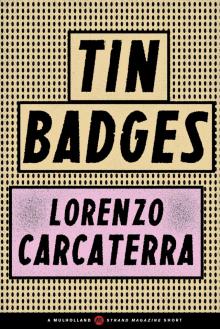 Tin Badges
Tin Badges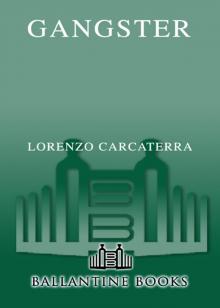 Gangster
Gangster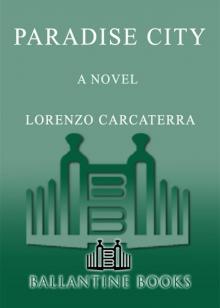 Paradise City
Paradise City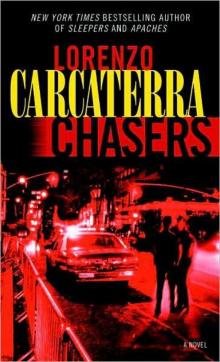 Chasers
Chasers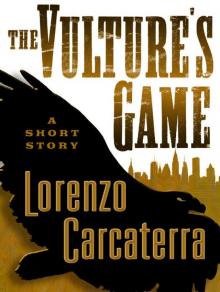 The Vulture's Game
The Vulture's Game Payback
Payback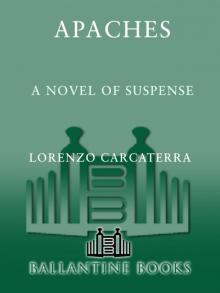 Apaches
Apaches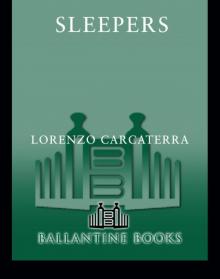 Sleepers
Sleepers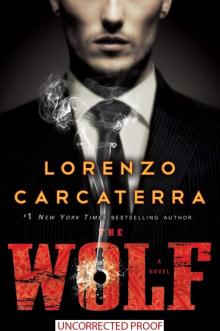 The Wolf
The Wolf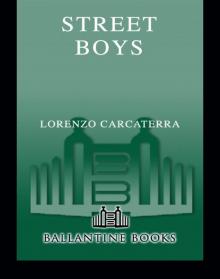 Street Boys
Street Boys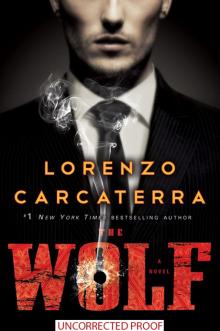 The Wolf: A Novel
The Wolf: A Novel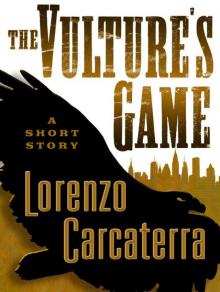 The Vulture's Game (Short Story)
The Vulture's Game (Short Story)